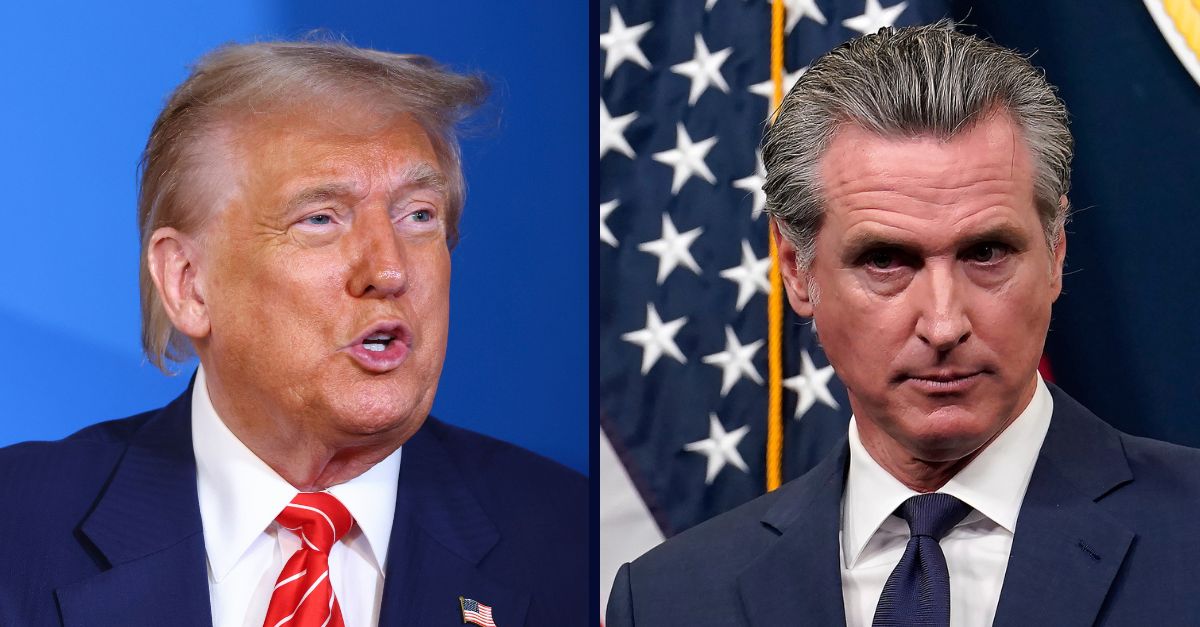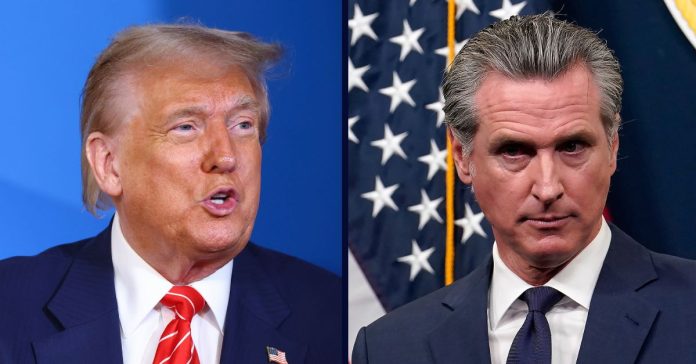
Left: President Donald Trump speaks as he arrives for a NATO summit in The Hague, Netherlands, Wednesday, June 25, 2025. (Piroschka Van De Wouw, Pool Photo via AP). Right: Calif. Gov. Gavin Newsom presents his revised state budget during a news conference in Sacramento, Calif., Wednesday, May 14, 2025. (Photo/Rich Pedroncelli).
The contentious case of President Donald Trump”s deployment of National Guard soldiers in California has reached a new stage as a federal judge granted California Gov. Gavin Newsom the opportunity for limited discovery — and kept the case in its current jurisdiction.
U.S. District Judge Charles R. Breyer of the Northern District of California found that Newsom is entitled to expedited discovery, but only on the issue of whether the Trump administration violated the Posse Comitatus Act, a law that forbids federal troops from operating as civilian law enforcement.
Following the filing of Newsom’s June 9 lawsuit, Breyer granted a temporary restraining order on the deployment, questioning Trump’s authority over the state’s guards. The U.S. Court of Appeals for the 9th Circuit, finding that Trump “likely” acted within his authority under 10 U.S. Code § 12406, which grants the president authority to call up the National Guard, put a stay on Breyer’s order. That ruling, according to the Trump administration, shows that any Posse Comitatus Act claim is overridden, and therefore discovery shouldn’t be allowed.
Not so fast, Breyer essentially said in his order, finding that the Trump administration was making this “newly minted argument” for the first time in this case.
“[T]he argument has not been fully briefed — Defendants make this argument in just a few sentences, and Plaintiffs have not even had a chance to respond,” the judge noted. “Indeed, the Court is unsure how far Defendants mean to take this newly minted argument. At its broadest, their argument could be construed to say that once the President federalizes the National Guard under § 12406, the Posse Comitatus Act cannot apply to any federalized National Guard members. But that would ignore key textual differences between § 12406 and the Posse Comitatus Act.”
The National Guard law, Breyer found, applies only to federal law, “and at most suggests that the National Guard might be able to enforce ‘those laws’ that the President was unable to enforce using ‘the regular forces.'”
“The Posse Comitatus Act, meanwhile, prohibits military forces from acting ‘as a posse comitatus or otherwise to execute the laws’ more generally,” Breyer added.
Additionally, the judge wrote, the success of this argument “may hinge on evidence that would be gathered in the very discovery that Plaintiffs seek.” In other words, discovery is needed in order for the judge to consider the argument at all.
“Plaintiffs’ Posse Comitatus Act claim might remain viable if they can present evidence that Defendants are using the federalized National Guard members to enforce state law or federal law unrelated to ‘those laws’ that justified federalizing the National Guard in the first place,” the ruling says.
The Trump administration’s argument also “blurs the lines between the matters over which this Court retains jurisdiction and those pending before the Ninth Circuit,” Breyer wrote, finding that the Trump administration is essentially asking the judge to “ignore the Ninth Circuit’s observation that ‘the parties’ disputes about how federal forces are being deployed are not before [it]’ and instead conclude that the Ninth Circuit implicitly foreclosed the same disputes it purported not to reach.”
“The Court is not inclined to infer and speculate as to the exact scope and impact of the Ninth Circuit’s stay order — an order which is by its very nature preliminary as the Circuit proceeds to hear the merits of the appeal,” Breyer added.
In discovery for the Posse Comitatus Act claim, Newsom is seeking information on “enforcement actions that have already taken place and generalized instructions on authorized use of these federalized troops and Marines”; documents on military operations taking place not on federal property but on Los Angeles streets; facts on the National Guard’s actions since Trump’s order calling them in; protocols or rules of engagement issues; “tailored written discovery” explaining how the protests justified the order; and depositions from some of the officials in charge.
The judge ruled that Newsom is “entitled to much of this information,” although the Trump administration is simultaneously allowed to claim that any number of the requested documents are privileged — and may make those arguments in court.
But, he found, “[f]or now, Defendants’ arguments about the overbreadth and burden of Posse Comitatus Act discovery are too abstract and unsubstantiated to prevail.”
Breyer opted to implement the expedited discovery schedule Newsom laid out in his brief, setting a July 11 deadline for discovery responses as “limited depositions.”
The parties have until July 15 to file a supplemental briefing on the matter.
In another win for Newsom, the case will remain in the Golden State’s Northern District Court, ruled Breyer, a Bill Clinton appointee.
“Judicial efficiency most strongly counsels against transfer,” Breyer wrote, as the San Francisco-based judge has already “invested significant resources” in the case that has produced hundreds “if not thousands” of pages of briefing.” Moving the case out of his court, he wrote, “is not in the interest of justice.”
The argument that Los Angeles — where anti-ICE enforcement protests that precipitated the National Guard deployment were widely held — was more convenient for potential witnesses carried some more weight, the judge noted, but he ultimately found the Trump administration’s argument to be too thin.
“Defendants do not identify any Los Angeles–based witnesses with particularity, explain why live testimony by those witnesses would be necessary given the circumstances of this case, or proffer that those witnesses would be unwilling to travel to give live testimony if deposition testimony were unsatisfactory,” he wrote.
As such, “The Court concludes that the public factors disfavor transfer in this case and that the private factors neither favor nor disfavor transfer, and accordingly denies Defendants’ request for transfer.”

